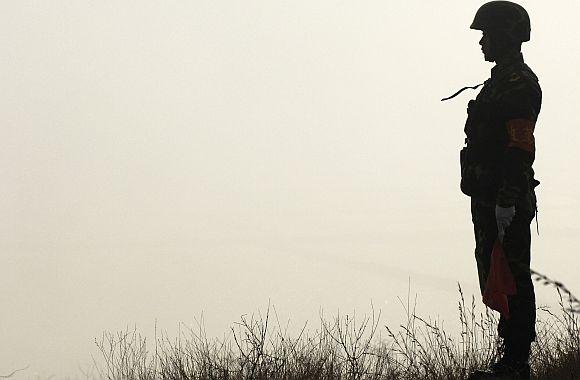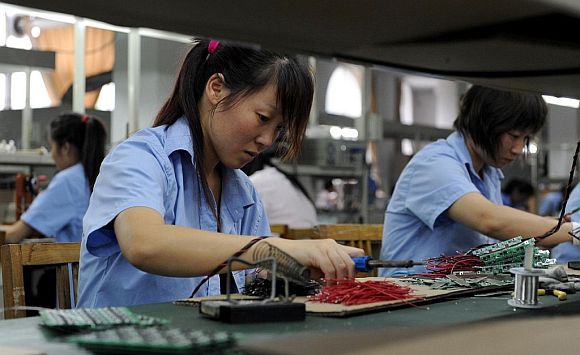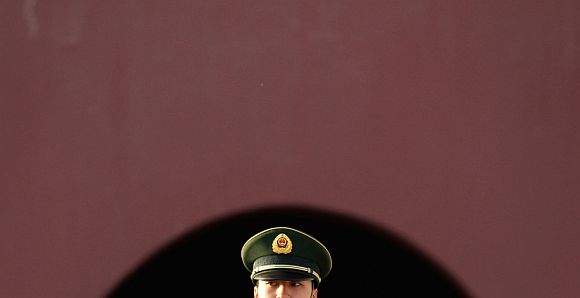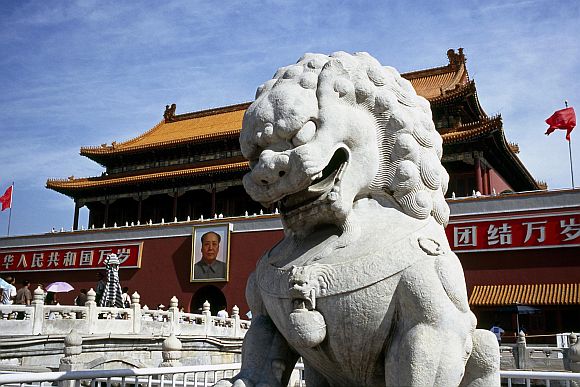
External, economic or ethnic, the sources of vulnerability are getting worse, and China's leaders do not have a switch to turn these off, writes Nitin Pai
This may come as a surprise to many, but China today is at its most vulnerable since the Tiananmen Square protests of 1989. That's not all; it is unlikely that the country will shake off its vulnerabilities -- geopolitical, economic and internal security -- over the next three to five years.
The developments in East Asia in the past few weeks, focused around the East Asia Summit at Bali, have put China on the defensive.
Not only is the United States reinvesting its military assets into the Indo-Pacific region, but almost all of China's neighbours have moved to construct bulwarks against China.
Even Myanmar is showing signs of wanting out of China's orbit, and is opening up to India, the United States and Vietnam. If countries of the region are ganging up against China, it is largely Beijing's fault.
...

Picking a fight with each one of your neighbours at the same time is not the smartest of moves. Yet, that's what China has done over the past couple of years.
What happened in Beijing's foreign policy kitchen is anyone's guess but China no longer enjoys a favourable external environment that it used to for the last two decades.
Let's come to economics. Not only does China hold more than a trillion dollars of US debt, it is likely to have to increase its dollar holdings given the sovereign debt crises in the euro zone. So a lot of China's money is, and will be for some time, at the mercy of its biggest strategic rival.
Productivity growth over the last three decades has lifted real wages in China. However, Beijing cannot allow wages to rise without losing competitiveness in exports and as an investment destination. When you have structural economic forces pushing up wages but the political system pushing them down, you risk labour unrest. This is already happening.
...

As productivity growth continues over the coming decade, Beijing will find it harder and harder to reduce wages. With the United States watching for the smallest signs of "currency manipulation", Beijing will not have the option of undervaluing its way to export competitiveness either.
If labour unrest is bad, ethnic unrest is worse. This year, three of China's largest minorities are simultaneously in ferment. Inner Mongolia and Xinjiang have seen violence. The Tibetan struggle is passing into the hands of a new generation and Beijing's problems might get worse in the post-Dalai Lama era.
External, economic or ethnic, the sources of vulnerability are getting worse. China's leaders do not have a switch to turn these off.
...

What should we in India make of this? First, we must realise that these vulnerabilities have come about because the Chinese government is not monolithic. There are factions within the Chinese ruling party and its armed forces.
The Shanghai faction, the Youth Communist League faction and the "princeling" faction are jostling for power within the Chinese Communist Party. Even if the top positions have been "settled" ahead of the leadership transition next year, the battle for the lesser positions is unlikely to have ended.
Factionalism extends to China's civil-military relationship and the People Liberation Army's organisational culture. This results in policy incoherence or self-contradictory behaviour, which might partly explain why China finds itself in troubled waters today.
...

M Taylor Fravel, an American scholar, argues: "When faced with internal threats, especially ethnic unrest in the frontiers, China's leaders have been much more willing to offer concessions in exchange for assistance that...[affirms] Chinese sovereignty over the areas of unrest."
Past performance is no guarantee of future profits, but there is, nevertheless, a chance that Beijing might prefer friendlier relations with India, and may even be willing to pay a price for it.
Fravel also notes that China's leaders have been sensitive to negative shifts in their ability to control disputed territory, and tend to use force if Beijing's relative position weakens.
...

Such red lines will become even more salient during and immediately after the upcoming leadership transition. Security architectures of the East Asia Summit might not change these calculations, but Beijing is likely to be a lot more circumspect in using force against nuclear-armed adversaries.
Unlike most countries whose leaders gathered in Bali last week, India today is in a position to be a swing power. In the emerging geopolitics of the Indo-Pacific, we do not have to choose between the United States and China.
There are two preconditions though. First, we need to have better bilateral relations with China and the United States than they have with each other. India has done fairly well in this regard.
...

Second, we should have credible capacity to inflict pain or give pleasure to these parties.
The Indian Navy's presence in East Asian waters is a good example of such a capacity. Instead of over-investing the defence budget to fight a repeat of 1962 -- an unlikely prospect given nuclear deterrence and other reasons -- it makes a lot more sense to rapidly scale up the capacity to project power in the Indo-Pacific.
This is just one instance of how thinking in terms of China's vulnerabilities will offer different prescriptions than thinking solely in terms of the "Chinese Threat".
The author is a founder of The Takshashila Institution, an independent-networked think tank on strategic affairs